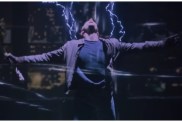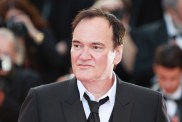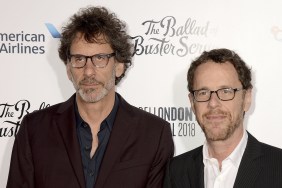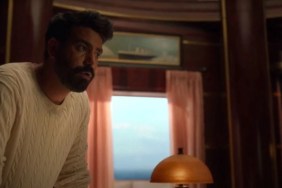
SHOCK’s Trevor Parker rises to the defense of one of Tarantino’s most maligned works.
Next year will mark a decade since the release of Quentin Tarantino and Robert Rodriguezs GRINDHOUSE, a double-feature throwback experiment that stroked the sensibilities of genre nerds while confusing and alienating the general moviegoing public. Upon GRINDHOUSEs theatrical release, anecdotes came flooding in of unhappy patrons complaining that the film was damaged, not realizing that the nicks and scratches were an intentional affectation made by the directors. Other viewers felt deceived and left wondering where Tarantinos contribution was, after they pulled on their coats and obliviously exited the theatre the moment credits for Rodriguezs lead film PLANET TERROR began to roll. General disinterest and the resulting box office take were disappointments that shook the filmmaking duos confidence and soon drove Tarantino into his current mature phase of meditations on American history.

Ten years on, the lasting effect of the GRINDHOUSE films is hard to gauge. PLANET TERROR is mostly approved of as a jokey zombie romp, while DEATH PROOF is the far more contentious pieceboth as standalone entertainment and as a component of Tarantinos broader legacy. The PROOF debate still rages hot to this day, and the nay votes are many: Swaths of Tarantino fans, both casual and obsessive, cite PROOF as the mans worst effort by a wide margin. SHOCK sensei Chris Alexander has been known to make snide dismissals of PROOFs merits while breathlessly praising the rest of Tarantinos output. Even Tarantino himself, most pointedly in a 2012 roundtable interview with The Hollywood Reporter, describes PROOF as the lowest point of quality that he can accept from himself and feels that the film stains his credits.
The reality is that DEATH PROOF, heavy flaws and all, is actually a vital organ in the Tarantino body of work: It is, in fact, the ultimate Tarantino film in that its such a personal workhis interests, his influences, his self-indulgences, and his fetishes (foot and otherwise) are all at their most prominent here. PROOF is the delirious fantasy daydream Tarantino had after a night binging on girl gang, muscle car, and cheapie slasher exploitation flicks. Its a film writ in Tarantinos largest, loudest letters, and its the obvious result of cinemas most exciting auteur never once hearing the word no along the length of PROOFs creation.

Lets address the chief complaint head on, that DEATH PROOF is unbearably talky. Here is where Tarantino did himself no favors. The average, square multiplex moviegoer has never seen SWITCHBLADE SISTERS, never heard of VANISHING POINT, couldnt tell Russ Meyer from Oscar Meyer or Jack Hill from Benny Hill. The exploitation films that fuel PROOF were no classics, but they have their admirers, including Tarantino. This isnt an argument to convince anyone that they are wrong to despise PROOFs endless gabbing, to disabuse the notion that Tarantino is infatuated with his own dialogue, but is instead a plea to understand that its insertion is deliberate and part of the pastiche. Tarantino is referencing the downside to a genuine seventies Grindhouse flick (particularly those produced by Roger Corman), in which the films budgetary production value is conserved and then unleashed in the third reel and shameless filler (usually lame attempts at comedy) pads out the rest of the running time. PLANET TERROR avoided the criticism by appropriating elements of more action-oriented grindhouse flicks along the lines of Umberto Lenzis NIGHTMARE CITY and modernizing them, amping them up with CGI and KNBs unparalleled effects expertise. TERROR trimmed the fat found on grindhouse movies while PROOF made a point of frying it up.

Once the ponderous lulls and meaningless girl talk can be reconciled (if never quite celebrated), PROOF bestows its goodies. Even the most passionate PROOF haters have a hard time denying that the vehicle stunts are pristine; brilliantly, thrillingly edited by regular Tarantino collaborator Sally Menke. The spectacular crash that places an exclamation point on the end of PROOFs first act is an absolute shocker that demands multiple rewinds, with KNB outdoing themselves on the gore inserts. The climactic cat-and-mouse car chase is executed with admirably old-school precision, helped greatly by Zoe Bell performing her own stunts and adding a sense of actual danger through the Jackie Chan factor. Speaking of Bell, playing herself here isnt much of a challenge to her as an actress, but her bubbly personality is showcased to sympathetic advantage (would the scene have been as effective if Tracie Thoms brusque, abrasive stuntwoman character had been out on the hood of that Dodge Challenger?). The rest of the casting is spot-on as wella resurgent Kurt Russell twisting his fatherly charm and charisma into something at first sinister and then pathetic; tonal hairpin turns that the originally-cast Mickey Rourke would probably not have been able to navigate as deftly. Sydney Poitier as Jungle Julia hits her characters haughty toughness with seemingly no effort, and its tragic that PROOF didnt heighten the actresss profile in Hollywood.
DEATH PROOF also brings us one of Tarantinos best soundtracks, filled with southern-flavored obscurities to evoke the films Austin location. Tarantino was an ace musical curator long before the word ever came into fashion, and the DEATH PROOF album features his most consistently listenable and least-gimmicky tune selections since JACKIE BROWN.

As for the plot, the girls getting the upper hand over the nefarious Stuntman Mike towards the end of the film is a hilarious and unexpected change-up, sure to slap a grin on the face of every FASTER PUSSYCAT, KILL! KILL! fan. It also rings somewhat true to life in this era of caustic online commenting: how many raving bullies quickly wilt when faced with a little push back? How much tough guy posturing melts like ice cream at the first sign of defiant contradiction?
The shorter GRINDHOUSE cut of DEATH PROOF is a leaner, smoother, and much superior creature (The lapdance scene adds nothing, apologies to Vanessa Ferlito). Detractors basing their opinion on the longer cut might want to give the original version a try. PROOF is worth the reassessment, as its messy, idiosyncratic pleasures most definitely earn it a proud and rightful slot in Tarantinos filmography.










